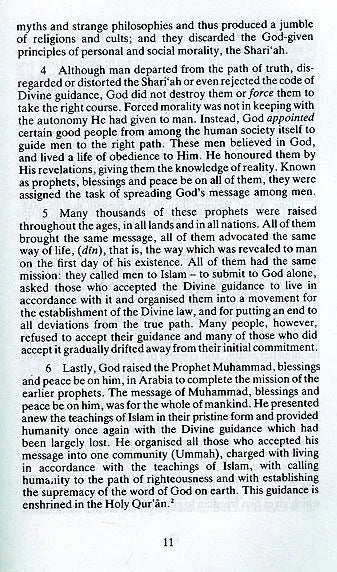A unique concise exposition of the Islamic world-view and its moral, political, economic, social,
About Author:
Abul Ala Maududi alternative spellings of last name Maudoodi, Mawdudi, and Modudi, also known as Mawlana Maududi), (25 September 1903 – 22 September 1979), was a widely read and highly influential 20th-century Islamist political philosopher, journalist, Islamic scholar, and Muslim revivalist leader in India, and later Pakistan. His numerous works were written in Urdu but translated into English, Arabic and many other languages. He strove not only to revive Islam as a
He was the founder of the Islamic revivalist party, Jamaat-e-Islami, and in Pakistan was considered the best known, "most controversial", and "most visible" religious leader in the country. He and his party are thought to have been the most important influences generating support for an Islamic state in Pakistan. They are thought to have helped inspire General Muhammad Zia-ul-Haq to introduce "Sharization" to Pakistan and to have been greatly strengthened by him after 10,000s of members and sympathizers were given jobs in the judiciary and civil service during his administration. Maududi was the first recipient of the Saudi Arabian King Faisal International Award for his service to Islam in 1979.
Khurshid Ahmad (Editor) born 23 March 1932; popularised as Professor Khurshid,
A senior and known ultraconservative figure, he has been a long-standing member of the Jamaat-e-Islami (JeI
Khurram Murad (Editor) with his da'wah activities began in Pakistan, has been involved in the promotion of the Islamic movement in Asia, Europe, and Africa. As a teacher and a
Khurram Murad served as Naib Amir (Vice-President) Jamaat-e-Islami Pakistan and Amir (President) in Bangladesh, a Trustee and a former Director General of the Islamic Foundation in Leicester, UK, and editor of Tarjumanal Qur'an, Lahore, Pakistan (a journal founded by the Islamic scholar, Abul Ala Maududi in 1932), and the quarterly Muslim World Book Review, UK. He was also a prisoner of war for many years in the 1971 Indo-Pakistani war. He was born in Bhopal, India, and after graduating cum laude, he took his Master's degree in Civil Engineering from the University of Minnesota. From 1975–1976, he was involved in the extension project of Masjid al-Haram in Mecca as he was a civil engineer by profession. He received his engineering degree from NED University, Karachi. During his time in NED, he gained stature as a student leader and later served as Nazim-e-Ala of Islami Jamiat Talaba for session 1951–52.
He was the author of over fifty works in Urdu and English.
He also edited Abul Hasan Ali Nadwi's work, Muslims in the West: Message and the Mission. Khurram also wrote over half a dozen books for children, edited and directed a video on "The Life of the Prophet Muhammad," and contributed dozens of scholarly articles to different journals and magazines. Over four hundred audio and video cassettes of Khurram Murad are in circulation in Pakistan and different parts of the Muslim World.
Murad was involved in Islamic da'wah and inter-faith dialogue in the West for the last twenty years. In this connection, he addressed dozens of conferences and seminars. His contributions in initiating and promoting strategic thinking on da'wah issues in Muslim countries as well as in countries where Muslims are in a minority have been immense.
show more













